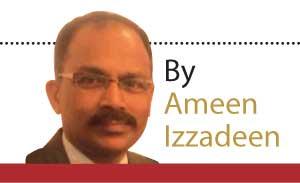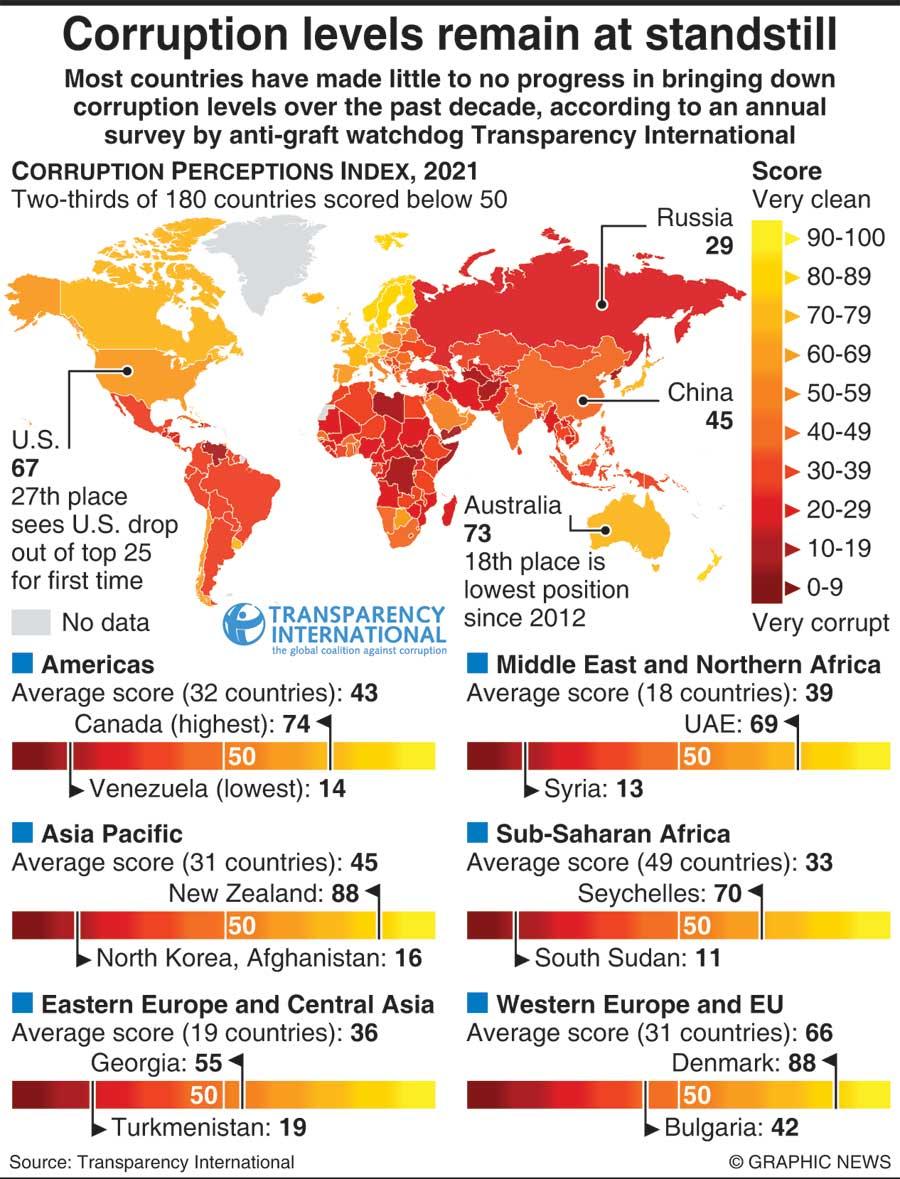Reply To:
Name - Reply Comment
Last Updated : 2024-05-18 20:50:00
Although children are born innocent, most of them, if they live long till old age, die corrupt. The longer we live the more we become corrupt. Of course, there are exceptions. They are the ones who through self-discipline and spiritual means save themselves from covetousness and lust. Even if they are pushed to penury and perish in poverty, they would stand tall and would not be dragged into corruption.
ones who through self-discipline and spiritual means save themselves from covetousness and lust. Even if they are pushed to penury and perish in poverty, they would stand tall and would not be dragged into corruption.
But throughout history, such principled people have been a rarity. Rarer in politics and state administration. Poverty persists and progress is sluggish because of the lack of honest people in politics and state administration. In other words, corrupt people, especially corrupt politicians are responsible for precipitating their nations into poverty. Corruption is a global pandemic. It has left no country untouched. Even the most vibrant democracies have fallen victim to corruption. On the Transparency International index, no country has ever scored 100 out of 100. Denmark, Finland and New Zealand, the three countries which ranked first on the 2021 index, scored 88 marks – meaning that some level of corruption does exist in these countries to deny them 12 marks.
Corrupt politicians and officials violate the people’s socio-economic rights. The Office of the United Nations Human Rights Commissioner says corruption can have a devastating impact on the availability, quality and accessibility of human rights-related goods and services. Moreover, it undermines the functioning and legitimacy of institutions and processes, the rule of law and ultimately the State itself.
This is why at the United Nations Human Rights Council sessions early this month the core group included the issue of corruption in the resolution against Sri Lanka, where corruption like cancer has spread to almost every cell of the body politic. The UNHRC resolution calls on the Sri Lankan government to address the ongoing economic crisis, including by investigating and, where warranted, prosecuting corruption, including where committed by public and former public officials. It also says the core group is ready to assist and support independent, impartial and transparent efforts in Sri Lanka’s battle against corruption.
In Sri Lanka, the battle against corruption has been largely a sham. Neither the governments since Independence nor corruption-busting agencies possess the will to fight the real big fight against corruption. They often catch the minnows and fear touching the sharks. No fight against corruption can succeed if there’s no political will to end corruption. Political will alone won’t end corruption. The country also needs an independent judicial system with zero tolerance for corruption and also tough legislation to end this socioeconomic and political disease.
Greater transparency in government can, to some extent, control the spread of the disease, but for this to happen, the country needs a value-based political culture and aggressive media activism determined to expose the corrupt. Often, anti-corruption campaigns in Sri Lanka are a one-big charade.
It is in this context that there is little public enthusiasm over the Ranil Wickremesinghe government’s efforts to present a new comprehensive anti-corruption bill.
In 2015, Wickremesinghe teamed up with the then-presidential candidate Maithripala Sirisena and made the fight against corruption the winning slogan. But when in power, the very government that came to office with a promise to crack the whip on the corrupt got enmeshed in a Treasury bond scam. The then President’s top official was arrested while he was counting millions inside a car in a star hotel vehicle park. This week, two officials of an Australian company were arrested on charges of bribing Sri Lankan officials to secure infrastructure contracts.
Power projects, highway constructions, and many mega projects in Sri Lanka are tainted with corruption. The 30-year civil war saw corruption taking the country to a new low with millionaires being made out of every military purchase. Though during the early years of the war, there was public resentment over corrupt military deals, towards the final years of the war, corruption was not made an issue in the larger interest of ending the war. But the public silence over corruption only encouraged people in power to indulge in more corruption on a gargantuan scale.
Wickremesinghe, now in the hot seat of power as President due to some quirk of fate and at the mercy of the very party whose leaders carry mountains of corruption allegations, may present anti-corruption bills to placate the international community, especially the International Monetary Fund which insists on more serious efforts to end corruption. But the public perception is that no matter how many bills are passed in Parliament to fight corruption, no big shot will ever be arrested and punished. Neither will there be any genuine effort through international mechanisms to recover Sri Lanka’s stolen money stacked in secret offshore accounts.
The more corrupt the state the more numerous the laws. So said Ancient Rome senator Tacitus. The quote is more apt for Sri Lanka which is struggling to come out of its worst-ever economic crisis that has its roots in the criminal culture of unchecked corruption.
In this hopeless situation, the silver lining appears to be today’s youths who call for a system change which among other things means an end to corruption. Yes, today’s youth must clean up the stables, for they will be tomorrow’s leaders. But judging by past experience, it is difficult to say that even if the Aragalaya leaders form the next government, they can stay clean of corruption. In the past, too, revolutionary youths and university students shouted themselves hoarse against social ills, but they withered away. Some who came into politics or took up top posts in state administration themselves became victims to the temptation to make more money through corruption, while a few honest among them remained silent, unable to expose the corrupt who were well connected.
If the President and the government are serious about the anti-corruption fight, they should follow Singapore’s example. When Lee Quan Yew took over the city-state, it was the most corrupt Southeast Asian state, but within a decade he eliminated corruption. For several years running, Singapore has been adjudged Asia’s least corrupt country. One of the reasons why multinationals prefer to come to Singapore instead of other regional countries that have a competitive advantage is Singapore’s anti-corruption culture and the strict application of the rule of law.

Adwani Saturday, 22 October 2022 03:12 PM
The more corrupt the state, the more numerous the laws. The beneficiaries in bribes are police, government workers and petrol shed workers.
Percy Wijenayake Saturday, 22 October 2022 07:39 PM
I fully agree that we follow Singapore, and everyone there loves their President.
Kumar Sunday, 23 October 2022 07:26 AM
Yeah, Australia claims to be a clean country. However, laundered black money flows into Australia all the time. Remember the Airbus deal. For a couple millions airbus got almost two hundred million. Airbus is in a clean country but corrupt others.
Tissa Fernando Sunday, 23 October 2022 09:01 AM
Favors based on Personal contacts, financial or other incentive based corruption, family and friends favouritism are very common in all these countries. In Sri Lanka, either you have to know someone inside or pay someone to get anything done. The corruption or favorism is now in the DNA of 90% people.

Add comment
Comments will be edited (grammar, spelling and slang) and authorized at the discretion of Daily Mirror online. The website also has the right not to publish selected comments.
Reply To:
Name - Reply Comment
The state-run loss-making State Mortgage & Investment Bank (SMIB) has reveale
US authorities are currently reviewing the manifest of every cargo aboard MV
On March 26, a couple arriving from Thailand was arrested with 88 live animal
According to villagers from Naula-Moragolla out of 105 families 80 can afford
17 May 2024 - 0 - 113